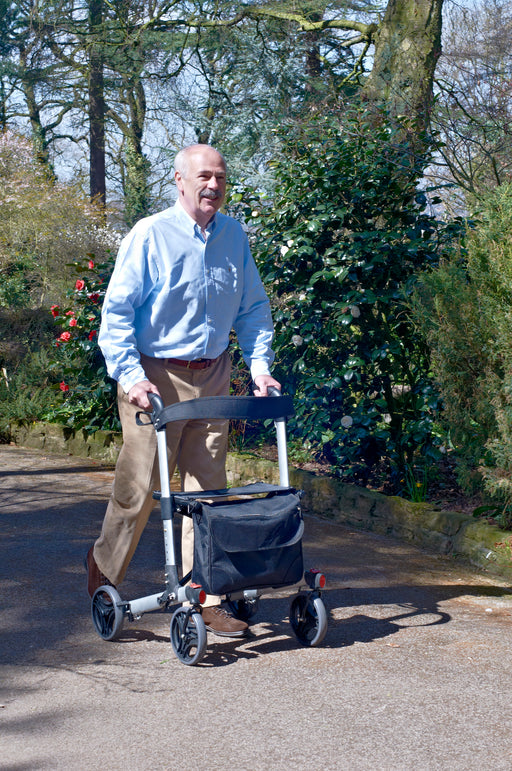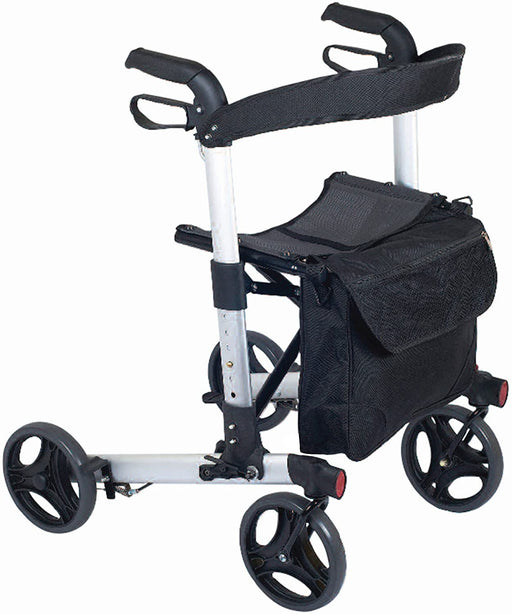What Are Walking Aids?
Walking aids, also referred to as mobility aids or disability walking aids, are essential tools for people who experience difficulty walking or standing due to age, injury, or medical conditions. These aids provide stability, support, and balance, allowing users to regain their independence and continue daily activities without the need for a wheelchair. Whether you’re looking for a simple cane or a more advanced walker with wheels, there’s a walking aid to meet your needs.
Who Can Benefit From Walking Aids?
Walking aids are designed for a variety of individuals:
- Balance Issues: Canes and walking sticks offer lightweight, portable options to help users steady themselves.
- Mobility Challenges: Rollators and walkers provide enhanced support and stability for those needing extra assistance.
- Recovering From Injury: Crutches and walking frames help during rehabilitation, reducing strain on affected areas.
- Elderly Users: Many aids are ergonomically designed for aging individuals, offering comfort, support, and safety.
Modern walking aids not only improve mobility but also promote better posture, reduce the risk of falls, and alleviate pressure on joints and muscles, making them invaluable for increasing the overall quality of life.
Types of Walking Aids
1. Walking Sticks & Canes
Walking sticks and canes are classic mobility aids, perfect for those needing minimal support while walking. Features include:
- Styles: Available as standard, quad, or offset designs to suit individual needs.
- Support & Balance: Ideal for users with good upper body strength who require help with balance.
- Lightweight & Portable: Easy to carry and store, making them versatile and practical.
2. Walkers & Zimmer Frames
Walkers, including traditional zimmer frames, provide enhanced stability for those needing more support than a cane.
- Standard Frames: Offer robust support with a simple, lightweight design.
- Rollators: These wheeled walkers include brakes and sometimes a seat for resting, making them great for outdoor use and longer distances.
- Adjustable Height: Many walkers can be adjusted to fit the user’s specific needs.
3. Crutches
Crutches are ideal for individuals recovering from injuries or surgeries.
- Types: Options include underarm crutches, forearm crutches, and platform crutches.
- Support: Designed for those with good upper body strength, crutches help reduce pressure on lower limbs.
4. Wheeled Walking Frames & Rollators
For those needing enhanced mobility, walking aids with wheels—like rollators—are an excellent choice.
- Maneuverability: Wheels allow for easier movement, especially on uneven terrain.
- Added Features: Many include built-in seats for convenience during longer walks.
- Versatility: Perfect for indoor and outdoor use.
5. Folding Walking Frames
Folding walking aids are portable, making them ideal for travel or compact storage.
- Lightweight: Easy to carry and transport.
- Space-Saving: Can be folded for storage, ensuring convenience when not in use.
Most Popular Disability Walking Aids
Walking aids are amongst the most popular products that we sell. Below are some of our best sellers:
Drive Devilbiss Healthcare Adjustable Folding Walking Stick
Drive Devilbiss Aluminium Tri Walker
Best Walking Aid for Balance
For individuals with balance issues, choosing the best walking aid for balance is crucial to maintaining mobility and confidence. Options include:
- Walking Sticks & Canes: Lightweight and portable, they provide reliable support. Quad canes, with their wide base, offer extra stability.
- Rollators & Walkers: Wheeled walking aids with brakes and seats, ideal for those needing stability and flexibility.
- Walking Frames: Designed for maximum stability, making them a dependable option for users who need significant support.
Whether you prefer a traditional cane or a modern rollator, the right walking aid for balance will depend on your unique mobility needs. Consulting with a healthcare professional can help you make the most informed
Should I Choose a Traditional or Modern Walking Aid?
Traditional aids like canes, crutches, and zimmer frames offer simple yet effective solutions for mobility challenges. However, modern aids like rollators and folding walking frames are designed using advanced technology, offering:
- Lightweight materials for easier handling.
- Adjustable features for user comfort.
- Enhanced mobility for indoor and outdoor use.
Choosing between traditional and modern walking aids depends on your personal preferences and mobility requirements.
Should I Opt For A Walking Aid With Wheels
Walking aids with wheels, such as rollators, are ideal for those seeking enhanced mobility and independence. Benefits include:
- Smooth Movement: Wheels allow for effortless motion, even on rough terrain.
- Versatility: Suitable for both indoor and outdoor use.
- Additional Features: Built-in brakes and seating options make wheeled aids particularly user-friendly.
If you need greater flexibility and support, walking aids with wheels might be the best option for your lifestyle.
What to Consider When Buying a Walking Aid
When choosing a walking aid, consider the following factors:
- Mobility Needs: Determine the level of support required, from basic balance assistance to full mobility support.
- Comfort: Look for ergonomic designs, cushioned grips, and adjustable features to ensure comfort during use.
- Portability: If you travel frequently, consider lightweight and foldable options.
- Terrain: Ensure the aid is suitable for your intended environment, such as indoor flooring or outdoor paths.
- Durability: Choose high-quality materials to ensure stability and longevity.
- Budget: Walking aids vary in price; find one that meets your needs without exceeding your budget.
Why Use Mobility2You?
At Mobility2You, we pride ourselves on providing premium mobility aids, including walking aids and zimmer frames, to enhance your quality of life. Our collection includes a wide variety of options, from traditional walking sticks to modern rollators, designed to meet diverse needs.
If you’re unsure which walking aid is right for you, our expert team is here to help. Contact us today to find the perfect solution for your mobility challenges.
The Best Way to Buy Walking Aids
Shopping for walking aids online provides a convenient way to compare features, prices, and customer reviews. Mobility2You offers a wide selection of high-quality mobility aids, ensuring you’ll find the perfect product to suit your needs—all from the comfort of your home.






